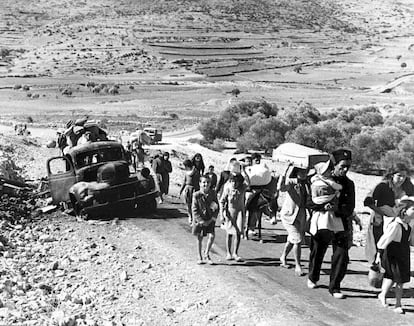Palestine: A state without full international recognition or absolute control of its territory
The ambition for self-determination faces the obstacle of the impossibility of exercising total sovereignty in Gaza and the West Bank


The Palestinian yearning to establish a state of their own has failed over the past seven decades. Israel’s occupation and the absence of a stable government throughout the enclave — one capable of exercising its administration autonomously in the West Bank and Gaza — have prevented the territories that make up Palestine from exercising their sovereignty or developing public policies for the approximately 5.5 million people who live there. Nevertheless, a total of 139 of the 193 member states of the United Nations have recognized Palestine as a full-fledged sovereign state (the United States and the major European countries, however, are not among them). What, then, is Palestine’s legal status and that of its citizens?
The Montevideo Convention of 1933 sets out the classic attributes that a state must meet to be considered as such: it must have effective sovereignty over a defined territory, a stable population, a set of institutions capable of responding to the needs of its citizens, and be recognized as an equal by other states. “In the case of Palestine, it could be included in the series of so-called ‘quasi-states,’ or states with limited sovereignty,” explains Isaías Barreñada, PhD in political science and co-author of Palestine: From the Oslo Accords to Apartheid (2023).
“It does not have effective sovereignty over its territory, but over a kind of archipelago of small portions of its territory,” says Barreñada, who also teaches international relations at the Complutense University in Madrid. The reason is that Fatah and the Palestinian Authority govern in a West Bank increasingly flooded with Israeli settlers, while Hamas governs de facto in Gaza. Nor does it have jurisdiction over the Palestinian population as a whole, insofar as some areas, those designated B and C under the 1993 Oslo Accords, are under Israeli control: the former only under military control and the latter under military and civilian control.
Palestine does have, according to Barreñada, “the attribute of having created institutions proper to a state, such as governmental or legislative institutions.” Proof of this is that “it has called elections and drafted constitutional texts.” And from the point of view of recognition, “it is quite extensive, but it is not the totality,” he explains. Specifically, 54 United Nations member countries have not recognized Palestine, among them, “Western powers such as the United States, Canada and a number of European countries,” among them Spain.
“In Spain the situation is very unusual because it has not recognized Palestine as a state, but there is a Palestinian diplomatic mission in Spain, headed by a Palestinian diplomat [Husni Abdel Wahed], whom Spain recognizes as ambassador and who has presented his credentials to the king,” notes Barreñada. Last week, Spanish Prime Minister Pedro Sánchez urged the recognition of Palestine as a state.
Palestine is, for its part, a member of international organizations such as the Arab League or UNESCO, and as of November 29, 2012, it has been a non-member observer state of the United Nations. The resolution adopted that day by 138 countries recognized “the right of the Palestinian people to self-determination, without excluding the option of a state.”
However, membership in international organizations is not a sufficient condition for Palestine to be recognized as such. “The recognition of a state is not given by an international organization such as the European Union, which does not have the competence to do so, or the United Nations,” clarifies Barreñada.
However, full membership in the U.N. is an important step, although the process is more complex. “The state will have to submit an application to the secretary general,” stating that it meets all the requirements, note Lisbeth Katherine Duarte Herrera and Jorge Daniel Miramontes Romero in the article “International Recognition of Palestine.” This request must be approved by an admissions committee linked to the United Nations Security Council, in which any of the five permanent members (the United States, Russia, China, the United Kingdom, or France) have the right of veto. Once that filter is passed, the U.N. General Assembly would decide by majority vote whether or not the country is admitted as a member state.
“In 2011, Palestine submitted its application, but the secretary general [Ban Ki-moon] knew that the United States would block it, so he froze the Palestinian request, which is still in a drawer, until there were conditions in place to avoid U.S. rejection,” explains Barreñada, who adds that it were to clear that obstacle, “we all know that, in the General Assembly, Palestine would have a majority.”

An “anomalous” resolution
To find a solution to the current Palestinian situation, it is necessary to delve into the origins of the conflict. “The uniqueness of the Palestinian case lies in the fact that its project was interfered with by the Zionist colonial project and that the United Nations ended up settling on a partition, in 1947, which contravened the right to self-determination of the colonized peoples,” write José Abu-Tarbush and Barreñada in Palestine: From the Oslo Accords to Apartheid. As they conclude, the U.N. resolved a conflict generated by colonialism [Palestine was a British colony] in an “anomalous” way, which consists of dividing the territory in two so that one part is handed over to the settlers and the other to the indigenous population. This is the so-called “two-state” solution — one for the Jewish population and one for Palestinians.
“The Zionists of that time [the state of Israel was not born until 1948] accepted the U.N. proposal, but Palestine and the Arab countries rejected it, considering it a Solomonic solution,” Barreñada notes. “Imagine if that had happened with Algeria and half of Algeria had been handed to the French settlers and the other half to the indigenous Maghrebi population,” he says, highlighting the “anomaly” of this decision. “At the beginning of the 1970s, the Palestinians realized that the State of Israel was an irreversible reality, and it was at that moment that they accepted the recovery of the remaining territory, 22% of what was originally” historic Palestine, he adds. But Israel rejected this.
Palestinian nationality
But what nationality do the citizens of a quasi-state hold? Those Palestinians who after the proclamation of the state of Israel in 1948 remained in Israel adopted Israeli nationality. However, the legal status of the rest of the Palestinian population is very diverse. “Those who were born, for example, before 1967 in the territories administered by Jordan [in the West Bank] have Jordanian residency documents,” says Barreñada, while those who were born later have identity documents provided by the United Nations and, in the case of the youngest Palestinians, by the Palestinian Authority.
However, the situation of Palestinians in the diaspora — those forced to live outside historic Palestine after the 1948 Nakba — varies greatly from one country to another. There are some seven million Palestinians living overseas, according to the Palestinian Central Bureau of Statistics. “In some places they are listed as immigrants, in others as refugees, while others acquired citizenship of the host countries,” Barreñada explains.
In countries such as Jordan or Syria “they have many facilities, but in others, such as Lebanon, they only have United Nations documentation; if they leave they will never be able to return, and they have problems accessing the labor market because there are jobs that are forbidden to them,” says the expert. This variety of legal regimes, which can affect members of the same family — “grandparents with Jordanian documents and grandchildren with those of the Palestinian Authority” — sometimes prevents them from being able to meet again or leave the territory where they are living.
Sign up for our weekly newsletter to get more English-language news coverage from EL PAÍS USA Edition
Tu suscripción se está usando en otro dispositivo
¿Quieres añadir otro usuario a tu suscripción?
Si continúas leyendo en este dispositivo, no se podrá leer en el otro.
FlechaTu suscripción se está usando en otro dispositivo y solo puedes acceder a EL PAÍS desde un dispositivo a la vez.
Si quieres compartir tu cuenta, cambia tu suscripción a la modalidad Premium, así podrás añadir otro usuario. Cada uno accederá con su propia cuenta de email, lo que os permitirá personalizar vuestra experiencia en EL PAÍS.
¿Tienes una suscripción de empresa? Accede aquí para contratar más cuentas.
En el caso de no saber quién está usando tu cuenta, te recomendamos cambiar tu contraseña aquí.
Si decides continuar compartiendo tu cuenta, este mensaje se mostrará en tu dispositivo y en el de la otra persona que está usando tu cuenta de forma indefinida, afectando a tu experiencia de lectura. Puedes consultar aquí los términos y condiciones de la suscripción digital.








































